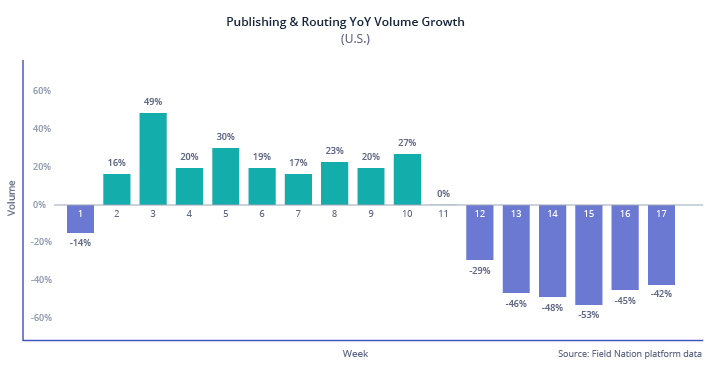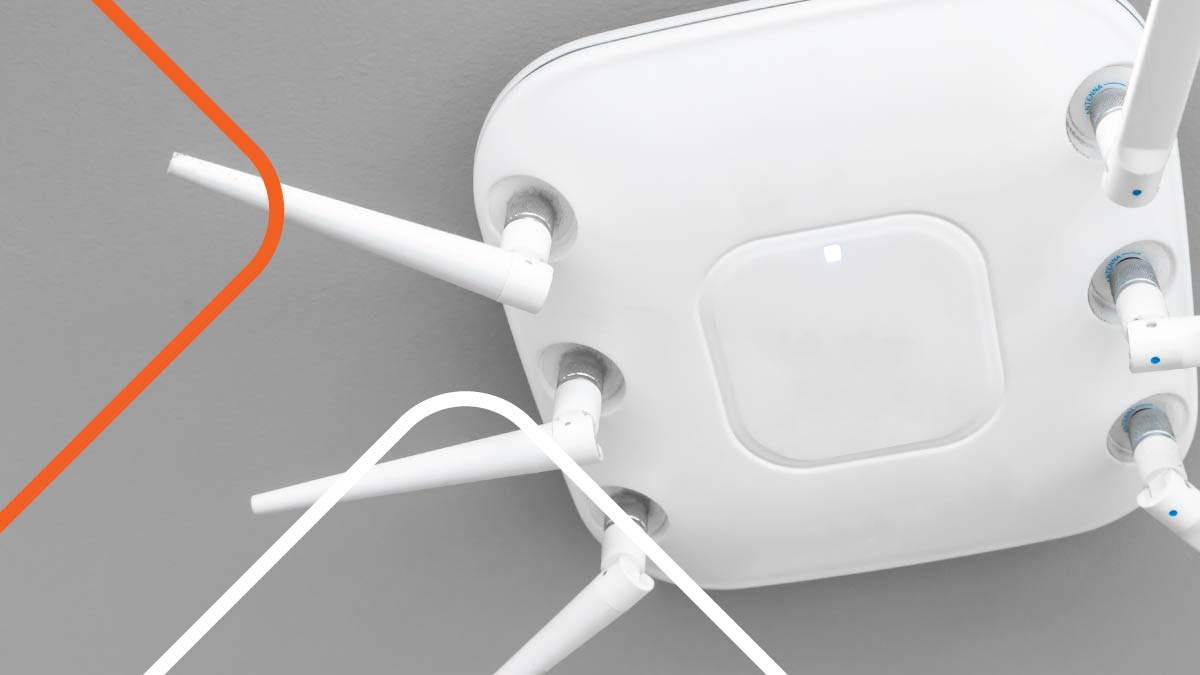
Field Intelligence: How to gear up for the rebound
May 8, 2020
Insights posted on 5.8.20
Given today’s rapidly evolving market dynamics, it’s difficult for field service companies to know where to focus their efforts. How should businesses prepare for the market rebound as restrictions lift and states begin to open?
To answer these questions, Field Nation experts wanted to share some insights based on conversations with customers and data from our network.
What is the current state of the field service market?
Based on the volume of work orders flowing through the Field Nation network, we believe the market hit a low point at the middle to end of April, which corresponds to weeks 14 to 16 on the chart below.
The good news is that we have seen the market stabilize with modest volume increases for the last three weeks. How will we know when recovery has taken hold?
Our definition of recovery is five to seven weeks of consistent week-over-week growth as well as positive year-over-year growth. This growth needs to be widespread across types of customers, types of work, and throughout the 10 largest states in the United States. From what we see in our network data, it appears that the market is potentially approaching the early stages of recovery.
Where do we see market shifts?
Although there are many unknowns about the virus and its impact, several trends are emerging that can help guide recovery efforts.
Retail will begin to open, starting with BOPIS
Many retailers are already beginning to open with a buy-online, pick-up-in-store (BOPIS) model. Longer-term, this could mean that a more substantial portion of retail stores will be set aside for preparing orders and pickup. As a result, companies that do not have BOPIS already in place will need to retrofit their businesses and meet this demand quickly. This will likely drive reconfiguration and technology-based project work.
Social distancing measures will continue
Retailers will need to modify their locations to meet new social distancing and safety standards. Products like sneeze and cough guards and signage to indicate proper distance are on the rise. Once the initial round of solutions is implemented, we’re expecting to see a wave of more significant projects that help enforce social distancing practices.
Use of connected devices will surge
As a result of this crisis, investments in connected devices will increase. While many companies have diagnostic capabilities embedded in their remote equipment, very few service incidents are resolved remotely. We’re expecting to see a dramatic increase in enabling existing infrastructure and installing new remote management technologies.
Companies will invest in new ways to go hands-free
In this new low-touch economy, we’re hearing a lot of interest in eliminating reasons why employees or customers would have to touch anything. For example, can a customer enter a store without touching a door handle or make a payment without touching a keypad? Businesses will be looking to replace locks, pin pads, and install a whole range of other hands-free devices.
Sanitization will rise in importance
Many companies today are meeting the immediate need for sanitization by adding workers, but we foresee a significant rise in technology and automation to make these processes more efficient and scalable. As a result, we expect businesses to modify and upgrade their existing high-end cleaning equipment. We also anticipate quite a few new technologies to come to market, such as ultraviolet sterilization equipment that’s used in operating rooms today and can be adapted for retail settings.
Three actionable strategies field service companies can adopt now
Many businesses are understandably operating in crisis mode today. While short-term priorities are certainly important, it’s also critical to maintain a longer-term focus. With that in mind, here are three actions you can take now to satisfy immediate needs and establish long-term success:
- Prioritize sales and marketing by continuing a regular cadence of touchpoints with customers. It’s important to be transparent regarding what you can do and how you can help. Be creative in addressing the unique requirements from this unprecedented situation by considering actions such as renegotiating SLAs and extending existing contracts. Also, focus your team’s attention on sending personalized emails to executives asking what they’re seeing in the market and offering ways you can help.
- Focus on cash capacity by reducing accounts receivable balances, renegotiating loan rates, and applying for additional funding as needed. Since many businesses are cash-constrained, there will be opportunities and challenges in the market as you start sending out bids. It’s critical to figure out your liquidity now so you can capitalize on opportunities as they arise. Consider loan options such as the Paycheck Protection Program and Economic Injury Disaster Loans if you haven’t done so already.
- Develop an on-site safety policy that is proactively communicated to both clients and technicians. As businesses open back up, they will increasingly focus on safety. The use of personal protective equipment (PPE) is likely to become required by law in some states. Being proactive by creating a policy positions you for these opportunities. Also, be sure to explain safety requirements to technicians well in advance of jobs so they can source any necessary equipment they don’t have on hand.
As the recovery unfolds, Field Nation will continue to deliver Field Intelligence insights to help you navigate the changing market.
—
Field Intelligence experts
Wael Mohammed has been in the IT services industry for more than 27 years. He has held leadership roles in both startups and large enterprises, including SPS Commerce, IBM, and Target. Wael is currently the Executive Vice President of Product at Field Nation, and oversees product management, product design, and data science. He is a master in identifying product and market growth opportunities, taking new products to market, and maximizing product performance.
Steve Salmon brings more than 30 years of leadership experience to the IT services industry. He has held senior roles in both startups and large enterprises, even co-founding a technology services company in 1992, which was later purchased. Currently, Steve is the VP of Enterprise and Channel Sales at Field Nation. Previously, he served as SVP of Global Managed Services Solutions at CompuCom, where the services revenue grew from $200M to more than $1B. Steve’s expertise and strategic prowess have landed him on numerous radio shows as a technology and business specialist.
RELATED RESOURCES
More from the field
- Success Story
- Success Story
- Success Story








